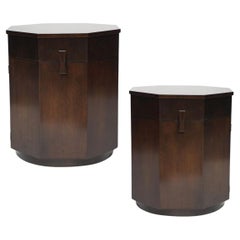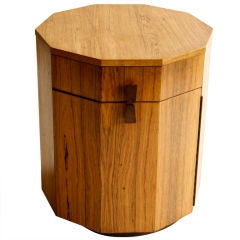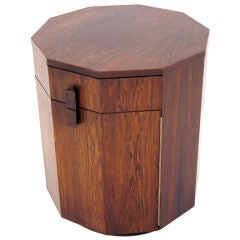Decagon Dry Bar
Vintage 1950s American Mid-Century Modern Side Tables
Wood
Recent Sales
Vintage 1950s American Dry Bars
Rosewood
20th Century American Mid-Century Modern Dry Bars
Rosewood
Vintage 1950s Mid-Century Modern Dry Bars
Rosewood
Vintage 1950s North American Mid-Century Modern Dry Bars
Rosewood
Vintage 1950s American Dry Bars
Rosewood
Vintage 1950s American Mid-Century Modern End Tables
Rosewood
Vintage 1950s American Mid-Century Modern End Tables
Rosewood
20th Century American Hollywood Regency Dry Bars
Rosewood
People Also Browsed
Vintage 1950s American Mid-Century Modern Table Lamps
Ceramic, Walnut
2010s South African Minimalist Night Stands
Poplar, Burl
2010s American Art Deco Side Tables
Brass
21st Century and Contemporary American Scandinavian Modern Wall Lights a...
Nickel, Brass
21st Century and Contemporary American Mid-Century Modern Flush Mount
Brass
21st Century and Contemporary Mexican Mid-Century Modern Floor Lamps
Textile, Wood, Linen, Fiberglass
21st Century and Contemporary American Mid-Century Modern Flush Mount
Brass
2010s Italian Modern Chandeliers and Pendants
Brass
2010s Mexican Mid-Century Modern Stools
Hardwood
2010s Italian Modern Table Lamps
Brass
Vintage 1960s American Mid-Century Modern Dry Bars
Burl
Vintage 1950s American American Craftsman Sofas
Poplar, Tulipwood, Walnut
20th Century American Mid-Century Modern End Tables
Walnut
Vintage 1950s American Mid-Century Modern Coffee and Cocktail Tables
Copper
20th Century American Mid-Century Modern End Tables
Brass
Vintage 1960s Danish Scandinavian Modern Dry Bars
Brass
Harvey Probber for sale on 1stDibs
A popular designer who had his heyday from the late 1940s into the 1970s, Harvey Probber is one of the post-war American creative spirits whose work has been recently rediscovered by collectors. His designs are by-and-large simple and elegant, but his signal achievement was to pioneer one of the key innovations of mid-20th century furniture: sectional, or modular, seating.
Even as a teenager, the Brooklyn-born Probber was making sketches of furniture designs — and selling them to Manhattan furniture companies. He began working as a designer for an upholsterer once he finished high school and, apart from a few evening classes he took as an adult at Pratt Institute, he was self-taught about design and furniture making.
After wartime service — and a stint as a lounge singer — Probber founded his own company in the late 1940s. A lifelong familiarity with the needs of New York–apartment dwellers doubtless sparked his most noteworthy creation: a line of seating pieces in basic geometric shapes — wedges, squares, half-circles — that could be arranged and combined as needed. Modular furniture remained the core idea of Probber’s business throughout his career.
As a self-trained designer, Probber was never wed to any particular aesthetic. He preferred the simple lines now associated with mid-century modernism for their inherent practicality, but often used hardware to enliven the look of his pieces, or added elements — such as a ceramic insert in the center of a round dining table — that was visually interesting and could serve as a trivet. He gravitated toward bright fabrics with attractive, touchable textures that might be satin-like or nubbly. Above all, Probber insisted that the sofas, case goods and other products that came out of his Fall River, Massachusetts, factory be built to last.
“The quality of aging gracefully,” Probber once told an interviewer, is “design's fourth dimension.” This quality he realized: Probber furniture is just as useful and alluring now as it was when made — and maybe even more stylish.
Find a collection of vintage Harvey Probber side tables, sectional sofas, chairs and other furniture on 1stDibs.
Finding the Right Dry-bars for You
The name “dry bar” can be a bit of a misnomer. After all, the last thing you would want a bar to do is run dry. In this case, the “dry” descriptor in your antique or vintage dry bar doesn’t refer to a lack of drinks. Instead, it serves to differentiate dry-bar furniture from wet-bar installations. The latter is typically a permanent fixture in a home, requiring plumbing to support a built-in sink.
In short, a dry bar is a piece of furniture or tabletop area that you’ve built into your space for mixing cocktails and storing everything needed —bottles, barware and other accessories — for the intoxicating in-home bar you’ve designed.
Some dry bars were built with minimalism in mind. Those crafted by designers associated with mid-century modernism or Scandinvanian modern, for example, likely looked to these as practical furnishings to serve as a cabinet or case piece. But there have been decorative and even outwardly sculptural interpretations by Art Deco furniture makers and those working in the Hollywood Regency style over the years.
No matter what kind of antique, new or vintage dry bar fits your space, these versatile furnishings can definitely elevate your home bar area as well as your hosting. We’ll toast to that!
Find your dry bar as well as all the barware you need on 1stDibs.






